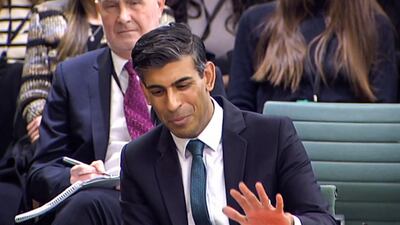Britain’s Prime Minister on Tuesday said he was “increasingly concerned” about Iran’s violent actions that threaten to destabilise the Middle East and Europe.
Rishi Sunak admitted there were issues in supplying ammunition to Ukraine but by the new year the country would receive a regular monthly stock of artillery rounds.
He also offered guarantees that migrants who had entered Britain illegally would be swiftly deported in legislation that will be passed next year, he told senior MPs at the high-ranking parliamentary liaison committee.
While the invasion of Ukraine was the main focus of foreign policy, Mr Sunak made it clear that the Tehran regime’s supply of deadly drones to Russia, as well as its nuclear programme and internal strife, had led to mounting concern over its actions.
“While Russia and Ukraine remain the number-one policy challenge as we go into the new year, I am increasingly concerned about Iran’s behaviour,” he said. “What they are doing in the region is destabilising. So I think it’s something we will need to spend an increasing amount of time on going forward.”
With more than 400 protesters killed in three months of protests against the regime, as well as public executions, Mr Sunak said Iran's “treatment of protesters is abhorrent”.
He said Britain had sanctioned 40 people connected with the harsh treatment of demonstrators and that attempts to restore the 2015 nuclear agreement were “failing”.
Alicia Kearns, chairwoman of the foreign affairs committee, asked whether press reports that Mr Sunak was conducting a “Goldman Sachs-style audit” of Britain’s commitment to Ukraine suggested a “downgrading of support”.
Mr Sunak disagreed, inviting her to “look at my actions” in that his first foreign trip was to Kyiv. He said Britain would “continue or increase” military support to Kyiv next year.
“We will make sure that support is effective in deterring aggression and push Russia back from territory that they have already seized,” he said.
He was questioned about the issue of supplying Ukraine with enough ammunition, with European stockpiles heavily depleted after nine months of war.
"This issue is less money than supply chain capacity in the short term," he said. "That is the limiting factor, to get some of the support flowing to Ukraine happening quicker. We need to make sure we get them what they need. The priorities are air-defence armoured vehicles, artillery and munitions.
"The £250m contract that we have just signed will ensure that there is a ready supply of artillery but also on a monthly basis so Ukraine can plan with certainty next year."
With a record number of illegal immigrants crossing the English Channel into Britain this year, Mr Sunak said he wanted “an immigration policy where someone who enters this country illegally” is not able to remain.
He referred to the policy of deportations to Rwanda and highlighted the introduction of new legislation next year to deter migrants from attempting to reach Britain.



















